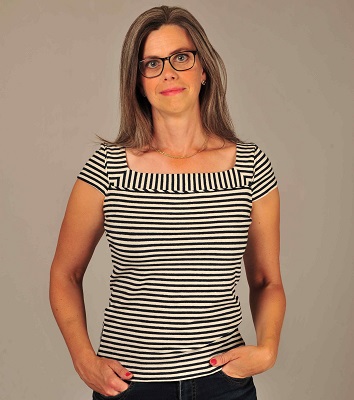Interview with Susanna Lundgren
We interviewed Susanna, who works at SIEMENS Energy AB as an expert within blade dynamics and contact mechanics, and was recently re-appointed as affiliated faculty in Solid Mechanics.

What is your role as affiliated faculty?
I’m employed 20% as affiliated faculty and focus on research to gain knowledge for my company. I’ve also supervised some master thesis students in collaboration with one of the professors.
Taking up a new position is a challenge on its own. What has your experience been so far?
I’ve enjoyed it, though it has been difficult to focus with only 20% of your time, when the daily work at Siemens Energy takes a lot of effort and time.
Tell us a little bit about you and your educational background?
I studied Vehicle engineering and applied mechanics at KTH, then made my PhD at the department of Solid Mechanics, also at KTH. As a child, I always liked maths and science. I grew up in a suburb of Stockholm, so it was an easy choice to study at KTH.
Why did you choose the field of solid mechanics? What made you interested in it?
During my last years as a master student, I focused on solid mechanics because I liked the subject and thought it was quite a solid, broad foundation for my working career.
How come you pursued academic work along with your work at SIEMENS ENERGY, are the two jobs somewhat related?
At Siemens Energy I work with research and development as an Expert within my field. To be a leading company within the energy sector, we need to be on the research front. When I got the opportunity to collaborate with KTH, I thought it was a perfect way of broadening our university contacts. It provides me with opportunities to easily discuss my work challenges with the skilled colleagues at KTH.
What is your work at SIEMENS ENERGY about? What makes it important?
I’m an expert within blade dynamics and contact mechanics and work with the development of the compressor blades in our gas turbines. It’s an important work as there is a continuous strive for more efficient turbines. We constantly need to push our limits without risking the security, which to me means to make sure the blades will withstand high loads. on the large scale, this is my way to contribute to a greener energy future.
What have been the biggest career challenges for you so far?
When I switched to the area of blade dynamics from more static mechanics work and had to learn a lot of new things in a very short time. It was challenging, but also interesting, fun and refreshing to make a slight career shift in the middle of work life.
What is your experience as a woman in the field of engineering and sciences?
I had to get used to being the only woman in most meetings, and everyone knowing who you are. Mainly I feel I’m respected and listened to, something that also has improved with age and experience. Sometimes it has been tough to be a minority, but mostly I think it has worked fine.
What advice would you give to young women interested in becoming scientists?
Don’t hesitate if you like science! Believe in yourself, expect people to treat you equally and to respect you and your expertise. Don’t accept being discriminated.
How could we attract more females into the field of engineering and sciences? Are there any actions taken by your work environment about it?
Difficult question. I see myself as an ambassador and role model, and always take the opportunity to take part in activities for female students etc, making myself visible. However, I think it would be good to start at an earlier age -introducing very young girls into maths and science. Maybe educating their teachers to change their mindset. At least, my experience from my daughters is that teachers don’t expect girls to be interested in maths and science, and many teachers to the younger kids are not interested themselves.
Siemens Energy works a lot with “diversity and inclusion”, which also includes attracting female engineers.
Is it important for you to communicate your research to the world, if yes, why and how do you do that?
My main focus is on communicating my research within my company, however, to publish articles becomes a part of that.
Text: Elina Charatsidou
